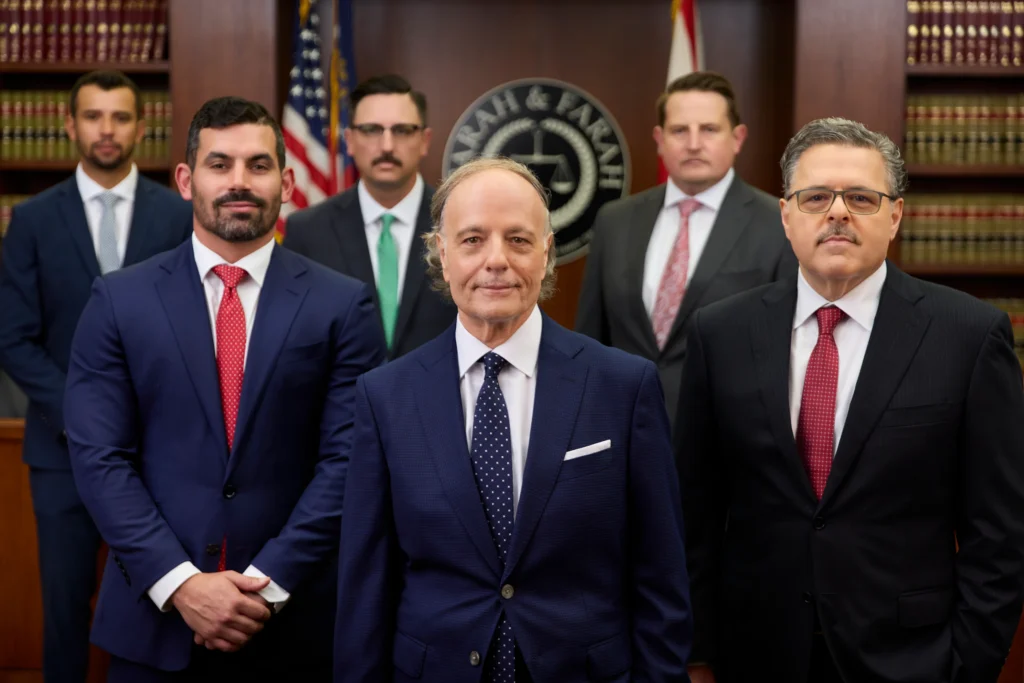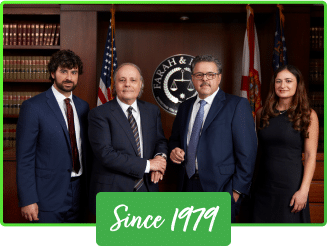Workplace Sexual Harassment Attorneys
Sexual harassment is unwanted physical contact, inappropriate verbal statements with a sexual context, and unwelcome visual communication that is sexually suggestive. Sexual harassment can come from a client, vendor, coworker, or supervisor. It is another form of discrimination within the workplace and directly violates Title VII of the Civil Rights Act of 1964–making it an illegal act. If you are the victim of sexual harassment in Florida or Georgia, contact our experienced workplace sexual harassment attorneys for assistance.

FREE CASE REVIEW
Home > Labor Law Attorneys > Workplace Sexual Harassment Attorneys
Why Should You Contact a Workplace Sexual Harassment Attorney?
Companies, agencies, and organizations with 15 or more employees must comply with Title VII of the Civil Rights Act of 1964. This law is designed to protect employees from discrimination based on sex, race, color, national origin, and religion. Title VII prohibits harassment of employees based on those same characteristics. This includes sexual harassment, such as unwelcome sexual advances or requests for sexual favors, and other verbal or physical harassment.
If you are a victim of sexual harassment, it is within your right to reach out to your HR department for corrective actions and an attorney to know your legal options to penalize those who have wronged you and broken the law. Contact Farah & Farah for your free consultation to speak to an experienced sexual harassment lawyer if you’ve been a victim of such unlawful acts.
What To Expect With Farah & Farah’s Workplace Sexual Harassment Attorneys
If we take your case, the legal team at Farah & Farah will be your representative and number one advocate. Farah & Farah attorneys bring years of experience and skill to the table regarding the complexities of employment law and seeking justice for those who are victims of harassment. Our team’s talent and dedication will work for you in the pursuit of justice, and, depending on your circumstances, we will fight to recover compensation for your emotional, psychological, and physical distress, as well as financial loss and even potentially punitive damages.
What Is Sexual Harassment?
Sexual harassment is an illegal act that occurs when a harasser conducts inappropriate sexual acts toward the victim that can result in emotional distress, mental disorders, and physical disturbances. Examples of sexual harassment can include:
- Comments on someone’s appearance
- Circulating nude photos
- Requests for sexual favors
- Asking about an employee’s sex life
- Discussing one’s own sex life in front of someone
- Commenting on the attractiveness of other people in front of someone
- Making sexual jokes
- Giving unwanted gifts of a sexual or romantic nature
- Sending suggestive emails or text messages
- Spreading sexual rumors
- Unwanted hugs or other touching
- And more
While sexual harassment may be most often thought of as men harassing women, it can happen to and be committed by anyone. It’s important not to dismiss sexual harassment just because it wasn’t perpetrated by a man against a woman. Sexual harassment also isn’t necessarily motivated by the perpetrator’s sexual desire; this type of harassment is based on the victim’s gender, which means that, for example, a woman can sexually harass a woman even if she’s not attracted to her.
What Effects Can Victims of Sexual Harassment Experience?
Being a victim and survivor of sexual harassment can have a long-lasting mental, physical, and emotional effects.
- Loss of sleep
- Nightmares
- Insomnia
- Lethargy
- Lack of appetite
- Weight loss
- Sexual problems
- Headaches and migraines
- Panic attacks
- PTSD
- Depression
- Anxiety
- Suicidal ideation
- Substance abuse
- Low self-esteem
How Sexual Harassment Can Affect Your Career
Sexual harassment can also have an impact on its victim’s career. Someone experiencing sexual harassment at work may experience decreased satisfaction with their job, missed promotion opportunities, absenteeism, reduced engagement at work, unfavorable evaluations, and more. Some of these negative impacts at work may come from the perpetrator or others who either support the perpetrator or seek to hide the harassment. They may also be the result of the physical and psychological effects of the harassment. For example, not sleeping well and having panic attacks could negatively affect job performance.
What Happens if the Harasser Says They Didn’t Mean It?
Even if the harasser stated they were joking around or didn’t mean for something to come off sexually, it doesn’t matter. What matters is the result of their action towards the victim. This means that if someone makes a sexual comment, for example, and then tries to claim that it was just a joke if the victim complained, it’s still considered sexual harassment. Whether or not they actually meant it as a joke doesn’t matter if the victim was made uncomfortable by the comment or joke.
What Does Sexual Harassment Look Like?
Sexual Harassment has two types: hostile work environment harassment and quid pro quo sexual harassment.
Hostile Work Environment Harassment
Hostile work environment harassment involves a singular episode or a series of unwelcome conduct toward an individual or a group that drives a hostile work environment. The offensive acts–ranging from verbal to non-verbal and visual to physical– can lead the individual or group to become uncomfortable fulfilling their daily responsibilities at work and create emotional and mental distress.
Physical Sexual Harassment
Non-Verbal Sexual Harassment can take place in the physical or virtual world. With so many social media platforms, non-verbal sexual harassment can come from stalking dating apps, spreading photoshopped photos of a sexual nature of someone in the office or online, and sending emails, DMs, texts, or photos of sexually suggestive acts.
- Patting
- Shoulder grab
- Hugging
- Kissing
- Pinching
- Intentionally grazing any part of the body
- Groping
- Fondling
Non-Verbal Sexual Harassment
Non-Verbal Sexual Harassment can take place in the physical or virtual world. With so many social media platforms, non-verbal sexual harassment can come from stalking dating apps, spreading photoshopped photos of a sexual nature of someone in the office or online, and sending emails, DMs, texts, or photos of sexually suggestive acts. Other actions can constitute non-verbal sexual harassment:
- Winking
- Exposing private body parts
- Following, stalking, and cyberstalking
- Invading personal space (blocking off your path)
- Unwanted gift-giving
- Staring
Verbal Sexual Harassment
Verbal Sexual Harassment can be blatant or used as an excuse for a joke. Victims may experience one or a series of verbal sexual harassment that will create a hostile work environment:
- Offensive comments
- Sexual jokes
- Using sexually suggestive pet names
- Requesting favors of a sexual nature
- Expressing their sexual desires and opinions on someone’s appearance
Quid Pro Quo Sexual Harassment in the Workplace
Sexual harassment in the form of quid pro quo is when a supervisor or manager attempts to force sexual acts upon a subordinate. They would use the sexual act as a bargaining chip in exchange for a promotion. Quid pro quo is a Latin term that means ‘this or that.’ Employers would dangle favorable shifts or promotions on the condition the employee returns the favor by submitting themselves to the employer’s sexual advancement.
Example Scenarios of Sexual Harassment in a Workplace
Sexual harassment can be obvious that anyone walking by can recognize it, or it can be disguised subtly so that victims often believe it might not have been intended as a sexual advance until the offense occurs more frequently and quickly escalates. Continue reading to review some example scenarios ranging from inconspicuous to flagrant acts.
Scenario 1
Mark began noticing a vendor lingering after dropping off supplies and staying by the door with his phone pointed in his general direction. At first, Mark ignored it and thought nothing of it. One day, the vendor approached him and asked him on a date. Feigning flattery, Mark thanked him and told him he was taken. Later that night, as Mark began closing his shades, he saw the vendor’s car parked outside his complex.
Scenario 2
After being encouraged by worried colleagues, Laura reported a sexual harassment claim, alleging that her supervisor had been inappropriately touching her and giving unwanted gifts on several accounts but did not want to go to HR due to her fear of retaliation. During the investigation, colleagues testified that they had seen the supervisor make several attempts to reward her with lunch, which escalated into expensive gifts. Another also testified being a witness to the succession of physical sexual harassment from a subtle graze to attempted groping by their supervisor toward Laura.
Scenario 3
Marge alleges that a colleague sexually harassed her in the workplace. Upon investigation, the colleague was found sending vulgar emails and texts of sexually suggestive photos and videos. When Marge confronted the colleague to stop, they began spreading rumors about her around work and posted a provocative photoshopped picture of her on social media with multiple people.
$2+ BILLION IN RESULTS

Workplace Sexual Harassment and Retaliation
If you or anyone you know has filed a workplace harassment claim and faces malice or negative consequences for involvement in the investigation or legal action, that is considered retaliation. Retaliation can occur in various ways: demotion, denial of benefits and promotions, less work, unfavored work shifts, or pay cuts.
You have the right to work in a safe environment and are protected from retaliation under federal law. Any retaliation toward an individual or group for speaking up and testifying on an illegal act done to them or someone they know, seeking resolution and corrective action is unlawful.
Is the Employer Liable in a Sexual Harassment Case?
When sexual harassment occurs in the work environment, the employer is immediately liable for a proxy or agent of the employer, which means that a company would be responsible for a supervisor’s actions. However, they would not be liable if they had taken reasonable action to prevent and correct the behavior and the employee being harassed indefensibly refused or failed to use the opportunities the employer presented to aid or correct the harassment.
Employers will also be liable if they knew or witnessed harassment by other employees, outside vendors, contractors, or clients and did not take corrective action.
What Laws Protect Against Sexual Harassment?
Laws that can empower employees to fight against workplace harassment and seek justice by providing legal recourse and protection. They convey that harassment in any form will not be tolerated, fostering a work environment where all employees feel respected and valued.
Title VII of the Civil Rights Act of 1964
Title VII protects employees in the private and federal sectors. Employers with fifteen (15) or more employees must legally comply with the Civil Rights Act. Title VII states that nobody should be discriminated against based on race, genetic information, color, national origin, religion, or gender. Protection under Title VII covers all decisions regarding the terms and conditions employees are employed under, including, but not limited to, recruitment, terminations, and selections.
What Is the Equal Employment Opportunity Commission?
The Equal Employment Opportunity (EEOC) was established to enforce Title VII’s requirements for private and federal employers. Individuals can file a lawsuit under Title VII to seek damages, barring relief, and unbiased relief. The Commission’s role is to investigate charges and assess all allegations in the charge before announcing their finding.
The Commission recently issued an enforcement guidance in April 2024 bringing into focus that within the last five fiscal years, “one-third of the charges of employment discrimination received by the EEOC included an allegation of unlawful harassment based on race, sex…or another statutorily protected characteristic.” This resource is for employees, employers, EEOC, and other agencies that investigate and educate businesses on workplace harassment; and also acts as a guide and resource for courts when they are determining harassment issues.
Occupational Safety and Health Act of 1970
Enacted to require employers to ensure that employees are working in a safe and nonhazardous environment. This act also requires employees to comply with the standards, rules, and regulations that apply to their work conduct. The Occupational Safety and Health Administration (OSHA) functions as an enforcer of such laws.
22 states have planned and executed their own safety programs that are approved by OSHA. Any business with more than ten employees is required to keep OSHA safety records. Exempt employers that do not fall under OSHA have businesses with less than 10 employees, a low-hazard workplace, and did not have more than 10 employees in the prior fiscal year (less likely to perform record-keeping for the current year). But, those small businesses are still encouraged to practice safety and health procedures.
How Does Florida Protect Employees From Sexual Harassment?
The Florida Civil Rights Act, Sections 760.01, exists to protect individuals in a workplace from harassment, discrimination, and retaliation related to:
- Age
- Race
- Color
- Disability
- Marital status
- National origin
- Pregnancy
- Gender
- Religion
Florida Civil Rights Act
According to the Florida Civil Rights Act, anyone subjected to any alleged workplace harassment has 365 days to file a case against employers, colleagues, customers, or vendors with the Florida Commission on Human Relations. The Florida Statutes Title XXIX, Section 394.4593 and Florida Statutes Title XLVI, Section 784.048, state that those found guilty of sexual misconduct, assault, and harassment can face charges of a second-degree felony, a first-degree misdemeanor, and a third-degree felony.
Florida and OSHA
Being a federal OSHA state, employers must comply with OSHA’s standards and regulations, such as identifying and resolving employee health and safety issues, hanging posters and warnings, educating and training employees, reducing the risk of hazards, and supplying protective gear.
Florida Commission on Human Relations
The Florida Commission on Human Relations (FCHR) was created with the vision of eliminating all discrimination in the state. FCHR staff have the authority to enforce The Florida Civil Rights Act of 1992, The Florida Human Rights Act of 1977, and others. If an employee files a discrimination inquiry, FCHR will suggest mediation between all involved parties to come to one of three agreements: negotiated settlement agreement, impasse, or independent settlement agreement.
How Does Georgia Protect Employees From Sexual Harassment?
Georgia has laws to safeguard Georgians from workplace harassment, which reflect the federal laws mentioned above. The Georgia Department of Public Safety and Supreme Court has implemented policy 5.01, which supports anti-harassment and prohibits workplace behavior. The state of Georgia also falls under the rules and regulations of OSHA–employers must ensure a safe workplace for all their employees.
for the family of a motorcycle rider killed by a driver who ran a red light
for a passenger injured when a truck struck a motorcycle
in the wrongful death of a wife who died in a motorcycle collision with a dump truck
for a rider who suffered a severe leg injury when struck by a car
for a rider injured when a careless driver pulled out in front of the motorcycle
What Can You Do If You're Sexually Harassed in Your Workplace?
If your company has a policy on how to report a claim of sexual harassment, contact your HR department and follow your handbook’s procedure. We recommend having a written copy of the complaint and receiving proof of delivery from the company to keep for your records. In the event that your company does not rectify the situation; this will be vital in a civil law case.
If your company does not take any corrective action, you can bring your case to the state or federal agencies; whichever you choose is essentially filing a case with both. You would file in order to charge the harasser and the company for discrimination with the EEOC) or the FCHR.

Farah & Farah encourages you to contact our attorneys, who have the knowledge and experience you need in managing sexual harassment cases. Our team is here to give you legal advice and fight for you to receive the compensation you deserve while seeking justice on your behalf. You won’t have to pay a thing unless your case is successful.
Civil Rights Discrimination Attorneys
Workplace Discrimination Attorneys














FREE CASE REVIEW
